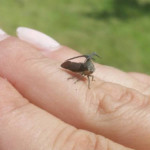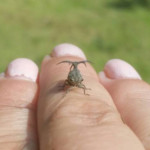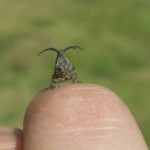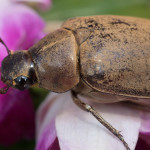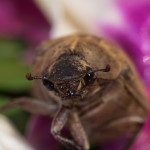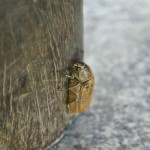Transverse Ladybird (Coccinella transversalis)
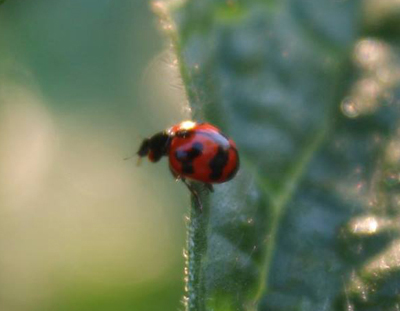
Image Copyright Perry Stevens
Last Observed: March 2016, Koh Chang
Observed By: Perry Stevens
This common species of ladybird is found from India across to Australasia.
From a human perspective this little beetle is one of the good guys since it preys on many plant eating insects such as aphids and leafhoppers that cause damage to commercial crops.
It has a black head and a red/orange body with sort of Rorschach blotches where (if you’re European) you’d expect to see spots.
Transverse Ladybird Wikipedia
Umbelligerus peruviensis
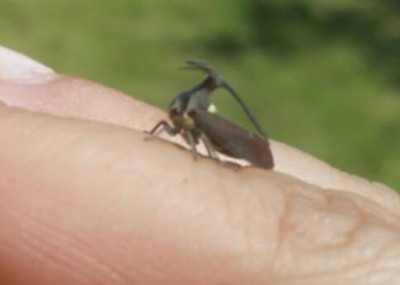
Image Copyright Rinske Hackman
Last Observed: February 2016, Koh Chang
Observed By: Rinske Hackman
The unique three pronged “antlers” that sprout from the head of this bizarre insect are almost like a helicopter’s rotor blades. They don’t turn of course. This fly gets around using its wings and the internet is unusually circumspect regarding what on earth the blades are for.
So I’m going to guess that they offer protection from predators by camouflage. Or maybe they are used in display to win potential mates? Or perhaps they are used to fight off other Umbelligerus peruviensis? Maybe the fly is wearing them for a bet? If you know please pass on a scientific answer.
Umbelligeris peruviensis National Geographic
Image Copyright Rinske Hackman
Image Copyright Rinske Hackman
Image Copyright Rinske Hackman
Masked Hunter (Reduvius personatus)
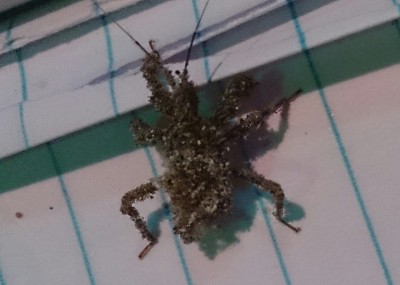
Image Copyright Lena Abi Chaker
Last Observed: February 2016, Koh Chang
Observed By: Lena Abi Chaker
The masked hunter is a small predatory member of the assasin bug family of insects. It’s another of those “you won’t believe it animals” that Koh Chang seems to specialise in. The photograph isn’t blurred, oh no. The sneaky masked hunter camouflages itself by covering its shell with dust, dirt and small particles of matter. Then it pounces on its unsuspecting prey ot woodlice, lacewings and other smaller insects. It also eats bedbugs in case you require a redeeming feature.
They apparently have a very painful bite which they can use in self defense – but fear not there’s no poison – for a change.
Masked Hunter Wikipedia
Jewel Beetle (Chrysocroa fulgens)
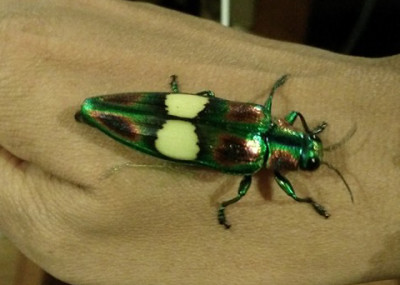
Image Copyright Paweena Khamsap
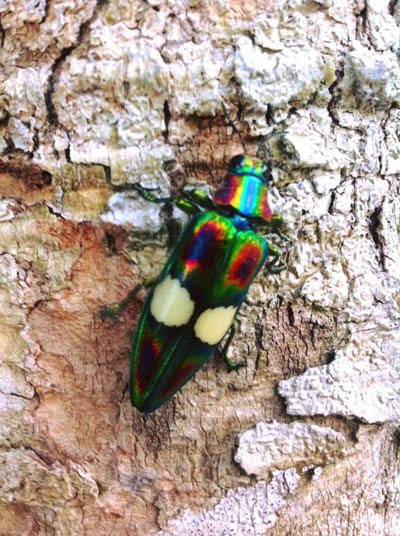
Image Copyright Nattapol Phutong
Last Observed: February 2016, Koh Chang
Observed By: Paweena Khamsap, Nattapol Phutong
The Jewel Beetle family are also known as the metallic wood boring beetles. Both names refer to their incredible iridescent shell which has a brilliantly coloured metallic sheen, and in the case of this species two ivory-coloured spots on the back.
Jewel Beetle Weevil Coleoptera-Atlas.com
Red Palm Weevil (Rhynchophorus ferrugineus)
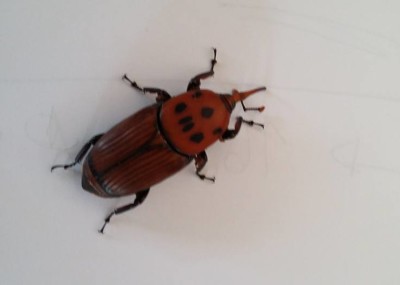
Image Copyright Jean-Pierre Odet
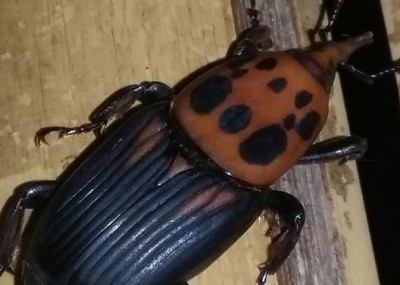
Image Copyright Jean-Pierre Odet
Last Observed: February 2016, Koh Chang
Observed By: Jean-Pierre Odet
The red palm weevil is a long-snouted brown and black beetle that grows up to 5cm in length.
They excavate holes in palm trees that can result in their death and they are considered a major pest in commercial palm plantations.
Red Palm Weevil Wikipedia
Dundubia spiculata
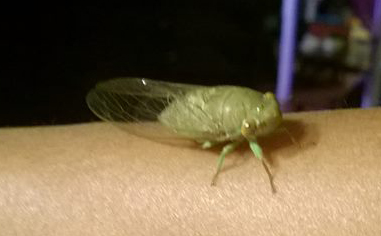
Image Copyright Napha Kotkangplu
Observed: February 2016
Observed By: Napha Kotkangplu
Dundubia spiculata is a species of Cicada found on Koh Chang. If you hear an unholy screeching racket round about sunset it might be this fellow setting up a hullabaloo with his wings.
Sugarcane Longhorn Stemborer (Dorysthenes buqueti)
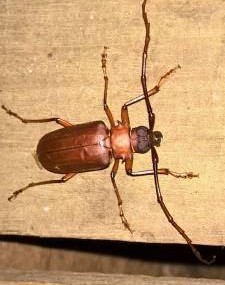
Image Copyright Nina Baum
Observed: February 2016
Observed By: Nina Baum
This species of longhorn beetle is considered to be a pest since its larvae dig into both sugarcane and bamboo leading to the death of plant.
It is a native insect of Southeast Asia.
Sugarcane Longhorn Stemborer Wikipedia
Diving Beetle (Dytiscidae)
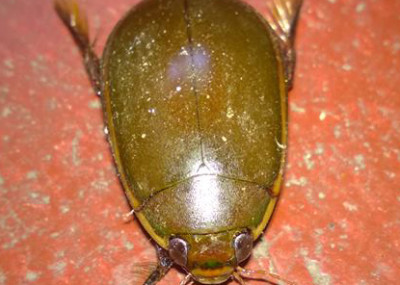
Image Copyright Napha Kotkangplu
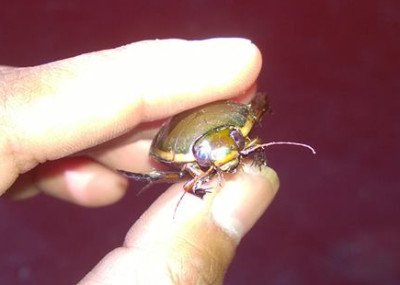
Image Copyright Napha Kotkangplu
Observed: February 2016
Observed By: Napha Kotkangplu
The diving beetles are a family of round-bodied beetles that grow to a maximum length of 4.5 centimetres.
There are loads of species of them and this… is one of them. If you’re a beetle expert feel free to let us know which one. The problem is that there are 4,000 species of diving beetle and they all seem to be small round and brown.
Life is short people so let’s just leave it at that for now shall we?
Diving Beetle Wikipedia
Sagra Femorata
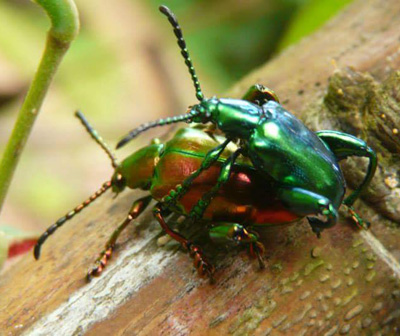
Observed: November 2015
Observed By: Coco Trilo
Sagrata felorata is a very beautiful small (20mm) beetle with a stunning iridescent blue-green colour. The species is widespread and is found across South and Southeast Asia.
The insects pictured are both males. The species exhibits a profound sexual dimorphism meaning that males and femals are very different in size and appearance – in this case the males are far larger and more brightly coloured.
Sagra Femorata Wikipedia
Lepidiota Stigma
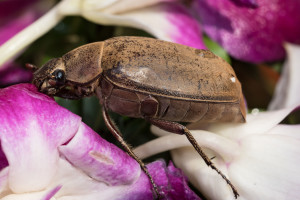
Image: David Vinot
Observed: February 2015
Observed By: David Vinot
Lepidiota stigma is a small beetle found in koh Chang.
It is noteworthy because it is capable of producing the purest natural form of white colouring – at least according to the link below.
Lepidiota stigma nhm.ac.uk



